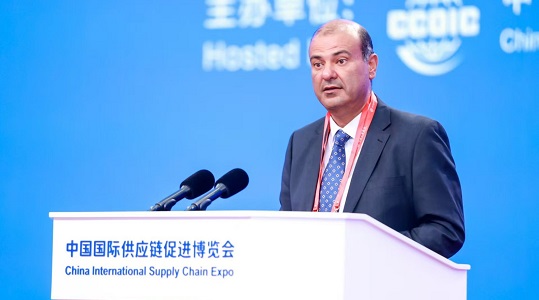The Secretary-General of the Union of Arab Chambers, in his keynote speech during the third China International Supply Chain Expo held in Beijing on July 15–16, 2025, unveiled the Union's vision for enhancing cooperation with China. “The plan consists of three strategic pillars: The first is establishing joint distribution centers and logistics ports in Arab ports, such as the Eastern Mediterranean, the Gulf, and African coasts. The second involves improving investment in connecting digital networks and electronic platforms, and transferring advanced technology from China to Arab factories as part of manufacturing localization. The third relies on digital transformation in supply chains through the adoption of blockchain technologies for shipment tracking and big data analytics.”
He stressed the importance of the constructive cooperation between the Union of Arab Chambers and the China Council for the Promotion of International Trade (CCPIT), particularly in implementing various initiatives and projects to enhance Arab–Chinese economic relations, including the establishment of major technological zones in Arab countries. He highlighted the significance of the Third China International Supply Chain Expo, describing it as the largest and most important global event focusing on supply chains in advanced manufacturing industries, clean energy, smart vehicles, digital technology, healthy living, and green agriculture.
The Expo witnessed the participation of around 650 companies from 75 countries, in addition to the presence of high-level official delegations from China and abroad, led by Chinese Vice Premier HE Li Feng, South African Deputy President Paul Mashatile — whose country chairs the G20 in 2025 — and the Chairman of CCPIT Ren Hongbin. Prominent CEOs of major Chinese and global companies also attended, including representatives from Nvidia, Apple, Airbus, Medtronic, AstraZeneca, GE Healthcare, and others, along with heads of international organizations.
On this occasion, Dr. Khaled Hanafy pointed out that "the volume of trade in goods between China and Arab countries rose from 303.8 billion yuan (around USD 42 billion) in 2004 to 2.8 trillion yuan (around USD 394 billion) in 2023, marking a remarkable growth rate of 820.9%. In the first four months of 2024 alone, trade volume reached 946.2 billion yuan, up 3.8% year-on-year, representing 6.9% of China's total foreign trade." He added, “Arab countries are among China’s largest energy suppliers, while China exports electronic products to the Arab world, including computers, vehicles, and digital infrastructure.” He also noted that “Shandong Province is one of China’s largest industrial regions, known for its advanced capabilities in manufacturing, electronics, and logistics infrastructure — making it a natural launch point for boosting supply chain integration between China and the Arab world.”
He concluded by saying: “We have a historic opportunity to enhance supply chain cooperation through joint logistical coordination and digital technologies, technology transfer, and localization of manufacturing industries in strategic partnerships with Shandong Province, in addition to launching logistics and industrial projects supported by data that confirm their economic and social impact. In this regard, the Union of Arab Chambers — representing the private sector in 22 Arab countries — is fully prepared to promote these initiatives and collaborate in setting clear roadmaps for concrete projects that lead to inclusive growth and mutual benefit.”
Meeting with ICC Secretary-General John Denton
On the sidelines of the Third China International Supply Chain Expo, the Secretary-General of the Union of Arab Chambers and member of the Board of Directors of the World Chambers Federation, Dr. Khaled Hanafy, met with John Denton, Secretary-General of the International Chamber of Commerce (ICC), to discuss coordination and cooperation mechanisms between the Union of Arab Chambers and the ICC to serve shared interests.
The meeting resulted in agreement on a set of joint projects through which the ICC could assist Arab countries experiencing exceptional economic and social conditions.
Denton expressed the ICC’s interest in implementing development projects in some Arab countries facing developmental challenges and in coordinating with the Union of Arab Chambers for the execution of such projects. The Secretary-General of the Union welcomed the ICC’s initiatives and expressed readiness to collaborate for the success of these initiatives, thereby helping to alleviate the impacts of current economic, social, and humanitarian conditions.
Panel Discussion on Clean Energy at China International Exhibition Center – Beijing
As a keynote speaker in a panel discussion on clean energy during the Third China International Supply Chain Expo, Dr. Khaled Hanafy emphasized that “the world today stands at a crossroads, where the shift to clean energy is no longer optional — it is a necessity for the future of our planet and the well-being of future generations.”
He stated: “Collectively, Arab countries produce more than 15 gigawatts of renewable energy — a number expected to triple by 2030. In contrast, China leads the world in solar and wind energy, accounting for more than 40% of global investment in renewable energy. The Belt and Road Initiative has already facilitated green energy projects worth over USD 50 billion across Asia, Africa, and the Middle East, strengthening ties between our regions.”
Secretary-General Dr. Khaled Hanafy reaffirmed that the Union of Arab Chambers is committed to enhancing cooperation between the Arab world and China. Through knowledge exchange, support for joint projects, and fostering technology transfer, “we can accelerate the deployment of clean energy solutions and unlock new economic opportunities.” He noted that estimates indicate that by 2030, the clean energy sector could generate more than 30 million new jobs globally, with significant potential for Arab youth and entrepreneurs.
Source (Union of Arab Chambers)

